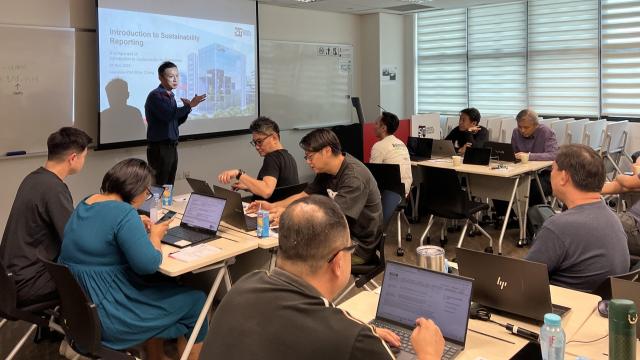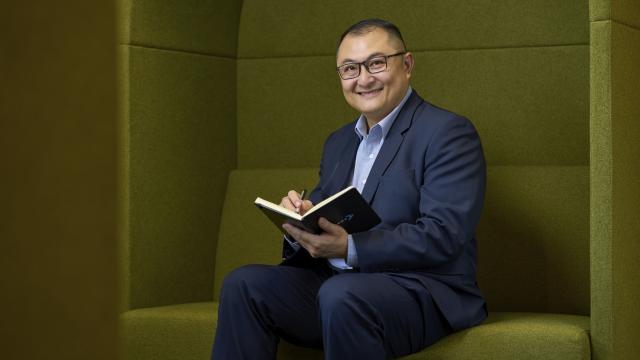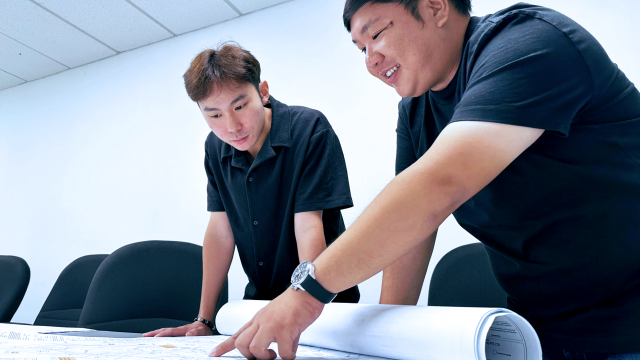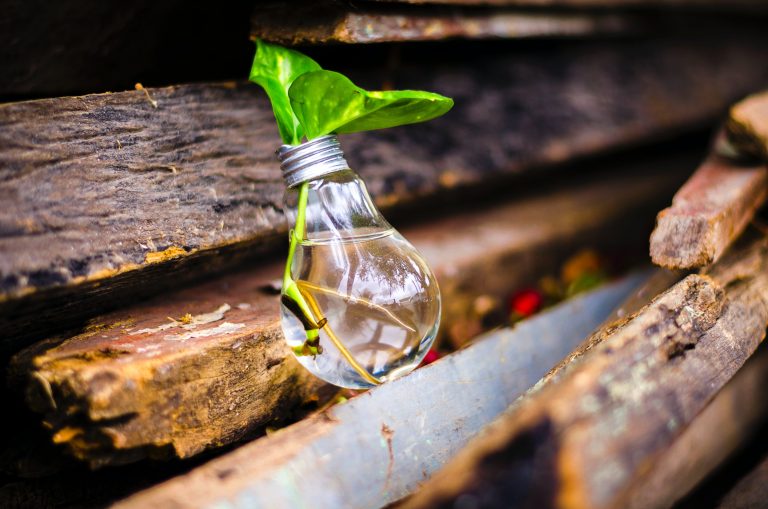 Do you believe youths have the power to change the world one innovative idea at a time? We always have, and The Mapletree Challenge 2020, that recently concluded, has renewed our excitement about the potential of our generation.
Do you believe youths have the power to change the world one innovative idea at a time? We always have, and The Mapletree Challenge 2020, that recently concluded, has renewed our excitement about the potential of our generation.
Are you curious about what took place? Read on to find out!
First of all, what is The Mapletree Challenge?
If you’re a student at the Singapore Institute of Technology (SIT), you would have heard of The Mapletree Challenge. Supported by Mapletree Investments Pte Ltd, the challenge is open to SIT students across all five academic clusters.
Now in its second year, The Mapletree Challenge’s theme this year was Reimagining Sustainability for Improving Our World.
A total of 44 teams vied for cash prizes and the priceless opportunity to prototype their innovations. After seven months of conceptualising, honing, and pitching, six finalist teams presented their entrepreneurial ideas to a panel consisting of SIT and industry via vodcast submissions on 23 July 2020.
Here is this year’s top three!
Fun Fact #1: Teams’ ideas were judged on their desirability, feasibility, viability and sustainability. The teams were also assessed on their presentation abilities, which were refined during coaching sessions and masterclasses conducted over the seven-month period.
1) Reducing plastic use in the Hospitality industry: Team Paste Pods
The global hospitality industry is one of the biggest contributors to single-use plastic waste, in huge part due to the convenience and durability that plastic affords. While hospitality companies like Hilton[i] and Marriot[ii] International have made moves to do away with plastic, the Green Lodging Trends Report 2018 has reported that only 30.7% of hotels surveyed have eliminated or reduced single-use plastics to a minimum.
Being Hospitality Business undergraduates, the members of Team Paste Pods felt strongly about this issue. They chose to explore sustainable options to replace single-use toothpaste tubes, as toothpaste tubes are typically made from blended material and thus difficult to be recycled[iii].
Here’s what they came up with: fuss-free toothpaste packaged with biodegradable seaweed abstract. Users can peel off the seaweed abstract or pop these edible paste pods directly into their mouth, and brush their teeth while reading a placard sharing with them how their use of the paste pods will benefit the environment.
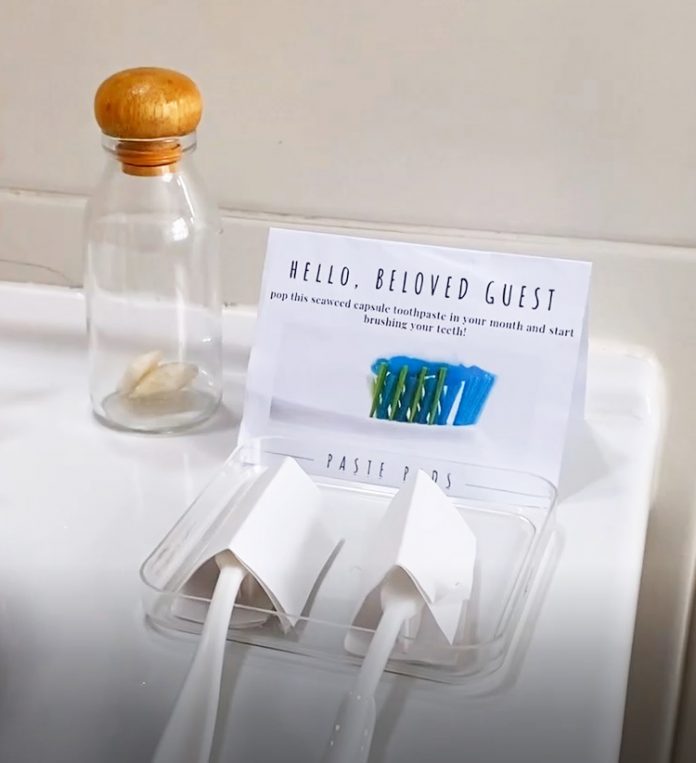 A mock-up of the proposed placard. Team Paste Pods is made up of Hospitality Business students Ivan Low, Aylmer Tan, Rachelle Lim and Teo Pei Ling (Image credits: SIT)
A mock-up of the proposed placard. Team Paste Pods is made up of Hospitality Business students Ivan Low, Aylmer Tan, Rachelle Lim and Teo Pei Ling (Image credits: SIT)
With the packaging sector accounting for the lion’s share of global plastic waste generation (42%)[iv], the positive impact of these paste pods will no doubt be immense. Team Paste Pods emerged champion in The Mapletree Challenge 2020 Grand Final, and we’re definitely looking forward to the prototype of these paste pods. We hope to use them during our hotel stays in the near future!
2) Waste not, dump not: Team Push It, Don’t Trash It
Did you know that a hotel room generates 3.8 kilograms of waste daily, but only 7.63% (0.29 kilograms) ends up recycled[v]? This happens due to logistical issues such as manpower challenges, and a lack of waste segregation abilities in existing room attendant trolley designs.
The members of Team Push It, Don’t Trash It proposed a three-pronged approach to improve the recycling efforts of both hotel attendants and guests. The first is a room attendant trolley with enhanced compartmentalisation. It will be made from recycled iron and coated with eco-friendly powder coating, to reduce greenhouse gas emissions and the production of hazardous waste.
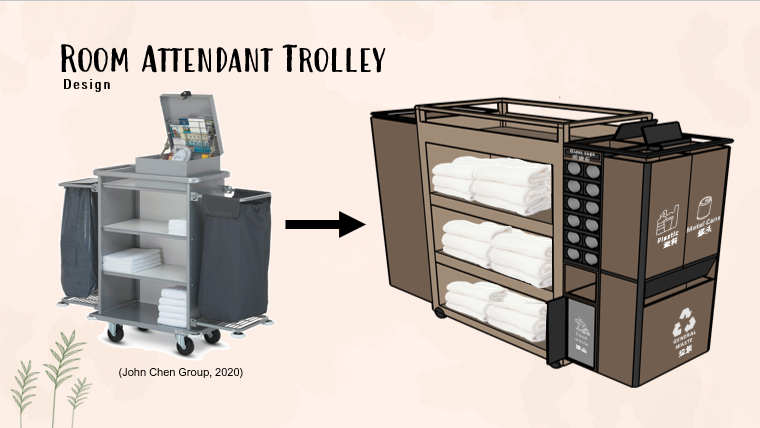 The typical room attendant trolley only allows for the collection of linen and general waste; the team’s design, however, allows for the segregation of plastics, metal cans, glass, general waste, and food waste. (Image credits: SIT)
The typical room attendant trolley only allows for the collection of linen and general waste; the team’s design, however, allows for the segregation of plastics, metal cans, glass, general waste, and food waste. (Image credits: SIT)
The enhanced room attendant trolley will work alongside segregated guestroom bins, making it easy for guests to practise recycling. The bins will be detachable, to help room attendants empty the trash easily, and be made out of heavy-duty reprocessed Polypropylene.
The last solution is guest instruction placards that will encourage all guests to do their part for the environment. These placards will be made of 100% recyclable material as well.
These are brilliant suggestions that we can’t wait to see materialise, and we congratulate the team—made up of Hospitality Business students Marcus Chew, Jocelyn Goh, and Lee Jia Shing—on winning the Mapletree Silver award!
3) Keeping Singapore clean: Team Senses Blue
A recent study published in the journal, Physics of Fluids, has found that the coronavirus can spread via aerosols generated by toilets, especially if toilet lids were not put down by previous users before flushing[vi]. As a result, many err on the side of caution through a ‘first flushing’.
This leads to significant water consumption—a full flush uses as much as four-and-a-half litres of water—and leads to higher water bills.
Eager to improve restroom hygiene standards and conserve water in the process, a group of Sustainable Infrastructure Engineering (Building Services) undergraduates came up with the Senses Blue system after close consultation with SIT’s industry partner, Khoo Teck Puat Hospital.
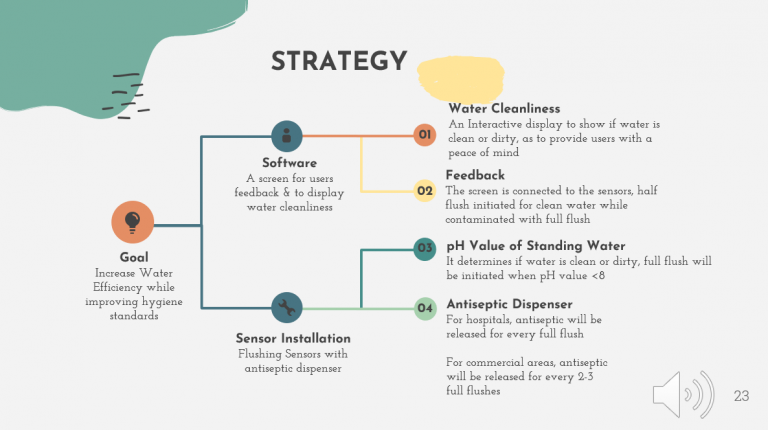 A summary of how the Senses Blue system will work. The system is the brainchild of students Yam Shien Hui, Tan Wei Kiat Nicholas, Shannyn Tay Wei Lin, and Teo Hwee Kee (Image credits: SIT)
A summary of how the Senses Blue system will work. The system is the brainchild of students Yam Shien Hui, Tan Wei Kiat Nicholas, Shannyn Tay Wei Lin, and Teo Hwee Kee (Image credits: SIT)
The first of its kind, the Senses Blue system integrates antiseptic detergents with every flush. Comprising both hardware and software aspects, it takes into account the pH level of the standing water and shares with users, via an attached screen, if the water is ‘clean’ or ‘dirty’. If the water is clean, the system lets users choose if they’d like to proceed with a half-flush or go without.
90% of individuals that Team Senses Blue surveyed found the system helpful, and would skip a ‘first flush’ if it was installed. Are you part of the 90%? The Digital Senior team certainly is!
Fun fact #2: Teams had to make sure that their proposed innovations will meet Sustainable Development Goals (SDGs) designed by the United Nations! There are 17 SDGs in total, which include sustainable consumption and production (Goal 12) as well as climate action (Goal 13). Learn more about the SDGs here!
Tough, but rewarding
All 152 participants put in a tremendous amount of effort into their innovative project entries, and the Digital Senior team is extremely heartened to know that the future is in the hands of these bright and enterprising young minds.
“The Challenge has been quite intensive over the past few months and we are honoured to have emerged champions. We are grateful for the opportunity and recognition by Mapletree and SIT, as well as the valuable mentorship rendered by our industry and communications mentors, Mr Zach Wilson, Managing Director, AlfaTech & DVUCA, and Dr Radhika Jaidev, Director, Centre for Communication Skills, SIT, respectively. This spurs us to keep proposing green solutions for a more sustainable future,” reflected Ivan, the project leader of Team Paste Pods.
If you’re an incoming SIT student, don’t miss out on this challenge when it rolls around! Why not take part and show the world the exciting ideas you have to change it for the better?
Which innovation excites you the most? Share with us in the comments below!
_____
[i] https://newsroom.hilton.com/corporate/news/hilton-calls-time-on-plastic-straws
[ii] https://news.marriott.com/news/2019/08/28/marriott-international-to-eliminate-single-use-shower-toiletry-bottles-from-properties-worldwide-expanding-successful-2018-initiative
[iii] https://www.marketwatch.com/story/colgate-reveals-to-competitors-how-it-makes-completely-recyclable-toothpaste-tube-2019-11-20
[iv] https://ourworldindata.org/faq-on-plastics
[v] https://www.nea.gov.sg/docs/default-source/our-services/waste-management/statistics-of-the-mandatory-waste-reporting-exercise.pdf
[vi] https://aip.scitation.org/doi/10.1063/5.0013318
This article first appeared on Digital Senior.

